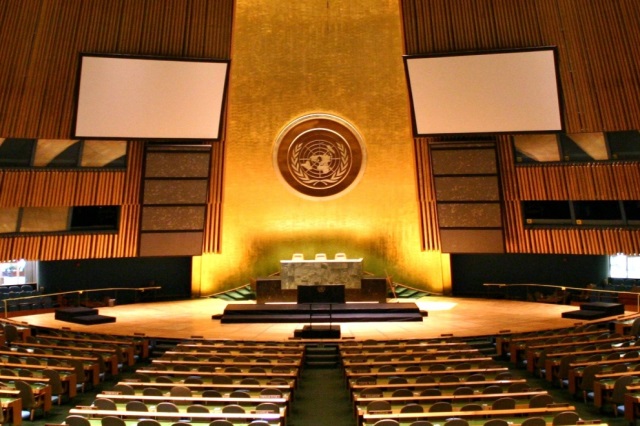The need for equity, urgency and ambition in dealing with climate change was emphasised during the seventh session of the UN General Assembly Open Working Group on Sustainable Development Goals (SDGs).
The need for equity, urgency and ambition in dealing with climate change was emphasised during the seventh session of the UN General Assembly Open Working Group on Sustainable Development Goals (SDGs).
Three members of the High Level Advisory Committee (HLAC) of the Climate Justice Dialogue addressed the session in New York last week, with key messages from the Declaration on Climate Justice being referenced throughout their contributions.
“All must act to tackle the disproportionate impacts of climate change on the poorest,” Dr Andrew Steer, President and CEO of the World Resources Institute and co-chair of the HLAC told the session. Dr Steer went on to reference the work of the Climate Justice Dialogue, an initiative of the Mary Robinson Foundation – Climate Justice and the World Resources Institute, aimed at mobilising political will for an ambitious and just international climate agreement.
Dr Steer also pointed to the importance in ensuring access to transformational technologies and addressing intergenerational equity, while emphasising how climate-smart development targets should support development pathways. “We can’t address the SDGs without addressing climate change,” he added.
Victoria Tauli-Corpuz, Executive Director of Tebtebba (Co-Organizing Partner for Indigenous Peoples’ Major Group), the Philippines, and HLAC member, spoke about the importance of intergenerational equity. Referring to indigenous peoples, Ms Tauli-Corpuz said: “Undoubtedly, we are highly vulnerable to climate change impacts and disasters. But we also have demonstrated great resilience to these…We are the ones who can demonstrate our capacities to preserve and sustainably use our ecosystems and resources because of our respect for nature, our sustainable lifestyles and livelihoods, ethics and cultures which respect intergenerational equity.”
She also referred to the Post-2015 Development Agenda as an opportunity to move away from the “business as usual” approach in society which has contributed substantially to the crisis of climate change, and called for “transformational framework and paradigm shift” in order to do this.
Fellow HLAC member Pan Jiahua, Director General of the Institute for Urban and Environmental Studies, Chinese Academy of Social Sciences, argued that, because the SDG process is not legally binding, it can influence the process of the UN Framework Convention on Climate Change. He called for the integration of the two agendas, which are both due for agreement in 2015.
In his presentation Prof Jiahua called for a paradigm shift away from industrial civilization and towards ecological civilisation characterised by man and nature in harmony where justice is central to how we act to protect our climate – ecological justice in respecting nature, and societal justice in protecting human rights.
In the final day of the week-long session, Dr Peter deMenocal, Chair of the Department of Earth and Environmental Sciences at Colombia University, made reference to an opinion piece by Mary Robinson published in the Huffington Post. In particular, he quoted the following:
“Climate change is, after all, a development issue. Unchecked, climate change will undermine development gains and increase poverty and vulnerability. … Acknowledging climate change and setting in place policies to address it can make a positive contribution to long term, sustainable growth, job creation and prosperity.”
Related Links
‘Ignore Climate Change at your Peril’ – Mary Robinson, Huffington Post


